Interview by Michelle Chaplow
Jean Marc Colanesi is a French brand consultant specializing in luxury markets. He combines his professional work with lecturing at two Spanish marketing educational institutes, ESIC Business & Marketing School and ICEMD (the Institute for the Digital Economy), where he teaches graduates and post-graduates, and provides in-company training. Jean-Marc is a regular speaker at “Hoy es Marketing” conference run by ESIC, one of the leading marketing events in Spain and is also a member of The Speaker Academy He also contributes to trade and general publications, both national and international.
1. Who do you think invented the concept of luxury and why?
This question is very difficult to answer, but if I had to choose one person, it would be Coco Chanel. For me, she was the first person who transferred her personality into a luxury brand, from the colours and shapes through to the design. But if you were to ask me which luxury brand I have the highest opinion of, it would be Hermes. They are constantly in search of creativity, art and history. And we could even say that there was a person who created a luxury brand without realising they were creating one, and that was Enzo Ferrari. When money is not a factor to acquire the product, that’s authentic luxury.
2 In a recent online interview you mentioned that the creator of a luxury brand needs to have a strong personality. Do you feel that this same rule applies to the historic hotel sector?
Of course. Luxury hotels – let’s say modern hotels or this new wave of six-star hotels – need brand positioning in order to gain clients; but in this way, they lose their luxury status and become premium. On the other hand, landmark historic hotels such as the Ritz in Madrid or the Hotel de Paris in Monaco, are hotels with strong personalities and secure luxury status. When it comes to luxury, personality is key – positioning doesn’t exist in the luxury sector; in the premium and upper-premium sectors, but not in the luxury sector. This is because a luxury brand is almost always born through the story of a family. It’s somebody who has created something, a concept, a hotel, a new style (way of dressing), which grew into a family business, and with personality and the passing of time, it becomes a luxury brand.
3 Would you agree that you can “sense” the history within a heritage hotel?
Definitely. Going to a luxury hotel like those that are being built today isn’t the same as going to one like the Ritz, where Hemingway or Marilyn Monroe stayed, because when you sleep in these hotels, you’re buying a part of their history and glamour. I have always thought that luxury means buying into a story. You want to be a part of the story, that’s why luxury brands need strong personalities.
4 There is an expression in the hotel industry that luxury can be bought but history must be earned. What are your views on this subject?
I agree completely. Like you, if I had to choose between working with historic hotels and working with modern-day hotels, I would work exclusively with the former. We are living in a society where we only genuinely appreciate creators after they’ve gone – that’s when they gain most of their reputation or notoriety. It’s not the same staying in the same hotel where a trendy contemporary artist has stayed or displays their works, as it is staying where a world-famous painter like Picasso spent the weekend. It’s impossible for an artist today to work fast enough to gain this same amount of fame, appreciation or notoriety, so that the reputation rubs off on the hotel. Off the topic of hotels, there is a restaurant in Paris, La Tour d’Argent (https://www.latourdargent.com), which is very good at using its history to its advantage.
5 How do you see the future of the branding of historic hotels?
If I could give historic hotels one piece of advice, it would be to flee from comparison sites – they’re not the place for them. Either such hotels understand their brand and they transfer it to the market, or nothing.
When a historic hotel offers substantially discounted rates on an online travel agency, say 60%, that hotel becomes normal and common – it devalues its own brand and loses cachet. The hotel is neglecting to take advantage of its own history and to explain who it is, its personality. Personally, if I go to a hotel and pay $1000 for a room, and I find out that someone in the next-door room paid $500, it doesn’t work for me. This is fine for other hotel chains, the more industrial ones, as nice as they are, but luxury hotels should not do this. If I was a regular client of luxury hotels and I saw one on an online travel agency, I wouldn’t go there.
Luxury brands need to have the same mentality as the legendary Rolls-Royce slogan: “If you need to ask, you can’t afford it”. You don’t go to a historic hotel saying that you’re going to try and pay as little as possible. You go there to live the era, live the story. You go to bed thinking that Marilyn Monroe or Clark Gable might have stayed in your room. That is what they have to work with, to bring the story alive. If not, they are just another hotel. If they don’t get off online travel sites, in my opinion, they’ve got no future as a luxury brand. They have to understand what they’ve got in their hands.
They could be on websites exclusively for luxury historic hotels, but they shouldn’t display their prices there. In the luxury sector there are two types of buyers – those who can buy the product because they have money, and those who say “Next year is my 25th wedding anniversary, I’m going to save up 500 euros a month to go to that hotel, no matter what.” I call these people “brand excursionists”. On this imaginary website for luxury historic hotels, where I would create a very strong image on an emotional level, I wouldn’t show the price or the availability, nothing. If someone was interested, they would go to the hotel’s own website, then say, I’d like to come to this hotel on these dates, and then the hotel could send them a tailored email, telling them the price – “by request only”.
It’s a bit like French restaurants – in the past, great restaurants in France had menus for female clients without prices on them (la carte de Madame), allowing diners to savour the ambience of luxurious indulgence and concentrate on the dining experience, without being distracted by prices. You need that sense of mystique sometimes.
I have worked in hotels and restaurants, but never in any hotels in the luxury sector – in any case, I am convinced that if I was to work for one of these hotels, I could turn it around so that people would weep when they had to leave; they would cry because they’d never experienced anything like it.
6. How important do you think that quality photography is for the historic hotel sector?
We live in a time where we are all virtually connected, independently of our social status. Photographs transmit the emotional message of the hotel via your mobile device or computer – visual story-telling. These hotels need photos that conjure up the same kind of mystery as a man saying “Let’s go and look at the stars”. When you look up at the stars, you feel something, and so when you look at a photo on a website you should feel something too, because the hotels only have ten seconds to sell themselves. What they have to do is invest in visual story-telling – in other words, photos and little text. This requires a lot of subtlety and emotion.
7. Do you view photography in the historic hotel sector as a worthwhile investment?
Whether you take one or ten photos, if just one of those photos leads to someone staying at the hotel and talking about it to their friends and associates, your investment has paid off. I would imagine that your photographic fee might seem expensive for some people, Michelle, but I am convinced that in the end, good photography for a luxury historic hotel is a sound investment.
8. Which historic hotel do you admire the most and why?
A hotel that I love is the Hotel de Paris in Monaco. Why do I love it? Because, for me, it’s all about personality. Or the Ritz in Paris – you go in and you feel like you’re going to meet people from a different era. We mustn’t forget that in some cases – I don’t know that many, of course you’ll know more – more than one landmark hotel has actually put a city on the map.
9. What’s your favourite historic hotel in the world that you would personally recommend to our readers?
As I said before, the Hotel de Paris in Monaco has a sense of glamour and frivolity, and it has brought a strong personality to the city.
If I had to summarise, I would say that having history on your side is a unique advantage that no other hotel can emulate. Secondly, it’s the only thing that is going to differentiate historic hotels from newly-built luxury hotels. Thirdly, flee from the comparison sites. Finally, personality, personality, personality. Leave the positioning to the others, that’s why they’re premium and you with personality are luxury.

